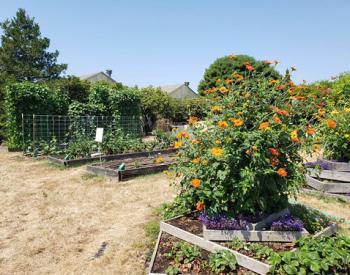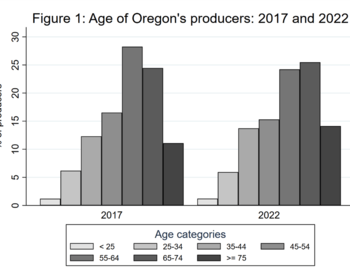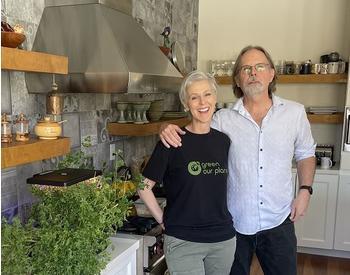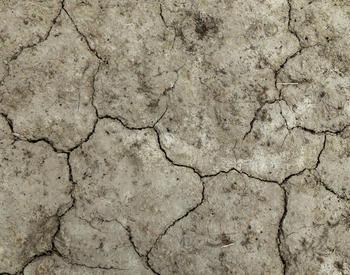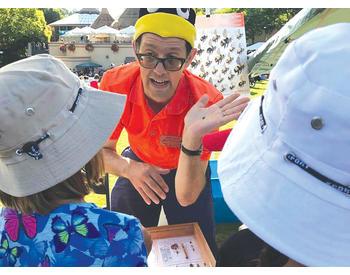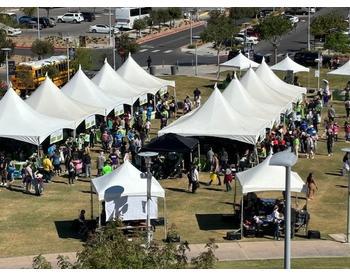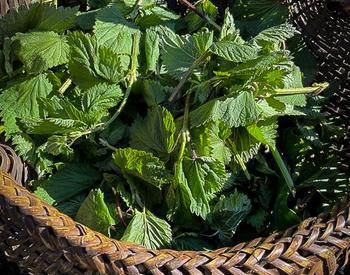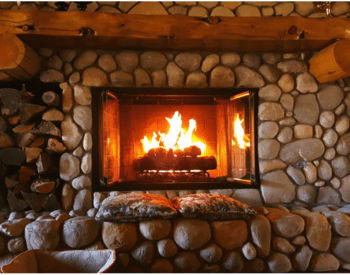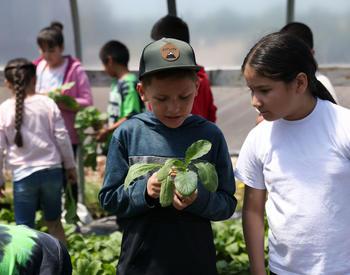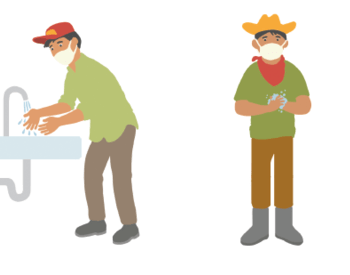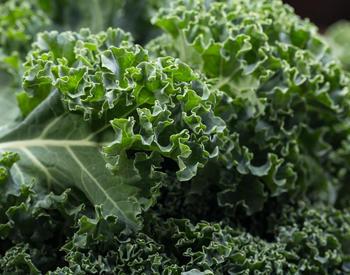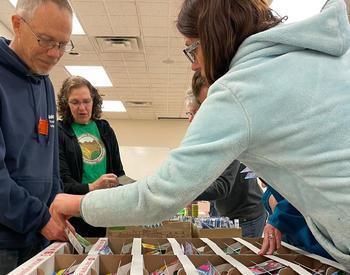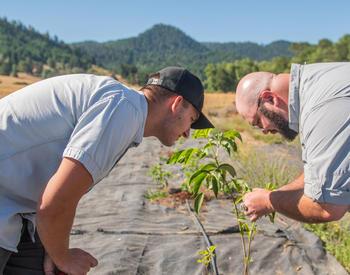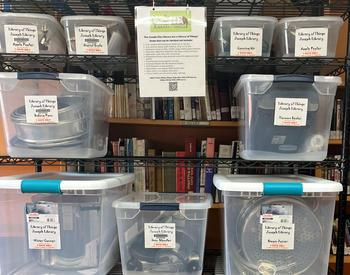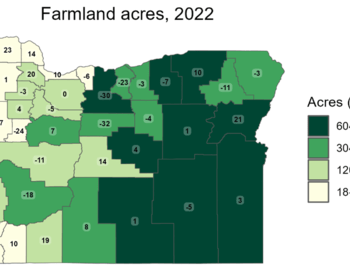Transcript
00:00:08 Rick
Welcome to farm to school podcast, where you'll hear stories of how youth thrive and farmers prosper when we learn how to grow, cook, and eat delicious, nutritious local foods in schools. We’re your hosts, Rick Sherman-
00:00:19 Michelle
And Michelle Markesteyn, we are farm to school coordinators for the state of Oregon.
00:00:26 Rick
Hey, Michelle, what do you think of when you hear of Lake Placid, NY?
00:00:31 Michelle
Well, you wouldn't know this, Rick, but I grew up in New York. And so I think of the time I broke my thumb skiing. My sister was in the junior Winter Olympics in Lake Placid for cross country skiing. And so I always think of.. The Olympics!
00:00:45 Rick
That's exactly what I think of too. I was a senior in high school when the 1980 Winter Olympics were happening. And I there's nothing better for me than watching an obscure sport like curling .. I mean in Canada it's a big, huge international sport, but hockey... the Miracle on Ice happened with the USA Hockey team. Oh, for me it doesn't get better than that.
00:01:13 Michelle
Well, I got something better for you, OK? I got Todd Ormiston of North Country School in Lake Placid, NY. Hey, Todd!
00:01:21 Todd
Hey, thanks for having me on, Rick and Michelle! And yes, Lake Placid is known for its winter sports. It's where it's February now, and we've got snow on the ground. Mount van Hoffenberg is the is the site of the Olympic bobsledding and losing and cross country skiing. So maybe Michelle, your sister probably broke her wrist maybe about a mile and 1/2 from campus here in Lake Placid. So it's right down the road.
00:01:50 Michelle
Well, for those of us who haven't been there, can you paint a picture for us? What is your school like? What's happening there?
00:01:57 Todd
Yeah. So, we're in what's called the High Peaks region of New York State. It's the largest State Park in the country by far. And the origins of the park are actually really important to recognize and acknowledge in, in the history of our camp and our school in the late 1800s, the Adirondack 6.2 million acre park in the late 1800s about 95% of the Adirondacks were deforested, and the governor then of New York State, put through the state constitution an act of the area here being called “forever wild” and he famously took a blue pen and drew a circle around the Adirondacks of the 6.2 million acre park, and said and designated all public lands as forever. There is a friend of our school, Bill McKibben, who's a wonderful environmentalist, said that the Adirondacks are perhaps one of the most important reclamation projects in the country, and it came with the Act of in addition to the state constitution. And so we really benefit from that history here and the recognition that land is, is unbelievably important to the survivability and thrive ability. But, plants and animals around us and so we have that, that history and that that important value set that that the school in our in our summer camp has taken on, particularly around farming and food and soil. And so it's an interesting back story that doesn't have anything to do with the Olympics. That certainly feeds who we are and what we do.
00:03:43 Rick
OK, well thank you for indulging us. That's just my own personal memory of a warm, fuzzy feelings of cold place that I just love. So your school is tucked in near that Adirondack area you're talking about with a that was circled - and how far away is your school from that place?
00:04:05 Todd
Yes, right. We're right in the heart of the Adirondack Park. And we're also in what's called the High Peaks region. So there are 46, four thousand foot peaks within 10 to 15 miles. And it's a beautiful setting that as farmers, you can also recognize that we're just over 2000 feet in elevation and we have a different way of approaching farming at 2000 feet in the heart of the Adirondacks than maybe you would in in a lower lying, more southerly area. Different challenges.
00:04:37 Rick
Well, tell us about that. What's different? What's the different challenge?
00:04:42 Todd
Well, a lot shorter growing season and we actually today were at lunch announced by our Garden Manager that today was the first crop of arugula that we grew in our aeroponic towers that we have here on campus. And so that was part of our meal today was arugula from the aeroponics. We will start to heat up the greenhouse for seedlings pretty quickly. We also have about 18 pregnant ewe’s right now that will be on Lamb watch for the next two or three weeks. So we'll be looking for probably 20 or so lambs to be born. And then of course, we're not Vermont, but we do have fantastic Maple syrup here, and we have a wonderful sugar Bush with about 250 sticks. And the sapp will start flowing probably late February, early March. So as much as we are in a cold region, there's a lot that we can do that we're industrious with what we have here.
00:05:47 Michelle
So you sound like you're running a full on farm and, but you're a school. So what role do the students have in the farm?
00:05:57 Todd
Yeah. So there's often the conversation of the two ends of the spectrum, petting zoo or commercial farm, and where do we fit in that in that spectrum? And we are a hard working farm, we at last are coming up in the spring, we'll put we'll plant about 900 lbs of potato seedlings and in the fall we'll probably harvest about 4500 lbs of potatoes and we take school off from that day and all the students are involved in potato harvest. So and then we have, you know, our root cellar where we're put our squash and potatoes and everything that we the over winters in the in the root cellar, so it's really important that we produce and that the students are engaged in the production of, you know, not just vegetables, but also in the in the barn setting with our chickens and turkeys and egg layers and whatnot. But we also need to recognize that our farmers, our educators as well, and so they are not always mucking stalls, they're often in our classrooms. We just had had just finished a unit of compost math with a 6th grade math class and we had our farmer in helping teach about our drum composter and carbon and temperature and chemistry and all that goes into the successful drum composter.
00:07:29 Michelle
Todd, that's incredible. And I guess I wonder, you know, kids who graduate from your school. Are you picturing them going on to be farmers or what does this experience working hard on the farm?
00:07:47 Todd
Yes. So we believe that there are there are sort of two transformational aspects of working on our farm here and one is in the moment when they're experiencing the work that they do and the products that that are born from their work, whether it's a, a healthy happy horse or wonderful carrots in the fall. So that's one aspect of it. The other is the transformational and enduring nature of being affiliated with a farm and with the work that goes in the farm and the respect of nature, of the soil of each other and of the amount of work that goes into it. And so we find that our current students are acknowledged daily what it means to be working on a farm. But then I I'm on the road quite a bit, and I'm speaking with a lot of our alumni and some of their fondest memories is composting or is mucking stalls or is chicken harvest or is some of the things that maybe kids today are not acknowledging is the most important thing, but that transformational enduring nature of being part of food production and working on a farm, and the empathy that that that they generate through that sort of selfless work is really important.
00:09:13 Rick
I'm so glad you said that because we we've certainly found that out too. We've, we've heard people say that kids in all walks of life and All in all settings, we have alternative schools, whatever. But where kids have said, if you would have told me that I would get my hands in this dirt and it would have changed my life. I would have thought you were crazy, but we hear that all the time. So thank you for that. So I wanted to step back a bit and thank you for painting the picture of your of your wonderful school and everything. And I I've seen pictures of it if you Google North Country School in Lake Placid, NY you can get there and we'll have a link to that in our show notes as long as well as your picture. But how did you get involved? What's your back story? Where did you come from? And all this and how did how was your journey in this?
00:10:12 Todd
Yeah. Well, it's interesting because I grew up on a farm. I grew up on a dairy farm in upstate New York, South of here. My family was deeply engaged in in dairy farming. And my extended family as well. As soon as I was able to work on our farm, I was working when I would be home from college for spring break. That was my spring break. And my family is still engaged in the farm. I started at the place of mucking horse and cow stalls and throwing thousands if not millions of square bails for with my cousins and at the end of a very long day, you could look at every one of those wagons that you filled with hay and acknowledge that that you accomplished something and that you that you could look at something as a tangible outcome. And hard work was involved. And you knew that the next morning those wagons would be waiting for you to unload in the morning. But you had that sense of purpose. And I think that that, that tangible sense of purpose for any young person is important and I think we in a lot of ways in the digital age, we lose that sense of purpose in that tangible nature of work and so my background, having grown up in the farm I'm an example of the lasting and enduring and transformational nature of caring for something else more important than me in the moment and being proud of the hard work that we put in. And I my brother and I talked about it all the time it was formative and it still is part of my life. I after the farm I ventured away is still staying in the Independent School world. But I also was a pretty highly competitive Alpine ski racer and I worked in many boarding schools that were cultivating future Olympians and future Division One ski racer athletes and it was a very different experience than where I am now. It's very mission driven schools, very outcome oriented and our school is, is process oriented and values driven. And so I really feel like I've come full circle in my professional career from where I started as a as a young boy.
00:12:45 Michelle
So it really sounds like your school is focused on process and really more about growing human beings than growing an actual product.
00:12:56 Todd
Yes, no question and we don't, we don't expect that every one of our students goes on to a life in agriculture, some do without a doubt and many also have a focus on sustainability and climate. But the real core of this is we're leveraging this experience on the farm to develop character growth and there are some things that we believe healthy, happy people are have developed not just self-esteem, but resilience. Grit. Understanding empathy, having an understanding of delayed gratification, where the Amazon age where we want our package tomorrow and that's not how life works. And for our children, they understand that planting a seed tomorrow in the in the greenhouse won't reveal a fruit for months and that that's really important for people to understand, because what often happens is children get frustrated if they don't get something right away. And with our children, we demonstrate and we celebrate patience and that that sometimes some, you know, sometimes things don't happen the way they're supposed to right away. And as adults, we understand and recognize that, but if children can understand and learn the idea of delayed gratification sooner, then then their sense of self and commitment to their own personal resilience, we believe is, is, is part and parcel to being a happy, healthy adult. And the other thing is, is that we talk a lot about life cycles on the farm and at the school. And it's the idea of especially at this age, our students are nine years old to 14 or 15 years old. I don't know about you, but that might not have been the best time of my life. That was the time when I was just trying to figure out who I was and that's what our children are doing right now. And luckily, they're in a really safe place where they're able to explore and they're able to engage that way and really grow and not just physically, but emotionally and character wise. So when we talk about life cycles, I mentioned Maple syrup season. You know that only comes once a year and there's a process to that and the trees go through a process that we watch with the beautiful green leaves in the spring, the dark green in the summer, a beautiful fall and then and then stick season in the winter time. We want our students to be connected to nature, connected to life cycles because we believe that the more connected they are to watching other things grow and develop, that they too see that in themselves. And it's really important for us to not just put students in those situations but to build in reflection time to think about what it means to grow and thrive and have your own personal life cycle.
00:16:21 Rick
Todd, that sounds wonderful. You've answered a lot of the questions I had coming up for me. But as a follow up for that, do you have any advice for others would be inspired for what you're doing right now?
00:16:33 Todd
Yes, absolutely. We we've been doing this for 103 years here on our campus and this isn't.
00:16:40 Rick
You don't look that old in your picture. That's really awesome.
00:16:45 Todd
HA HA -Well, it's organic farming and the the clean air.
00:16:48 Rick
OK. Right. Wow.
00:16:52 Todd
No, I think that this is not something that happens overnight, especially at a any type of a school or nonprofit organization. It has the culture has to be ready to accept the idea and the and the people have to be engaged in the pros. There are scalability aspects to this that that are important for any organization, and anyone who's listening to this as an educator or a parent or an interested party is that you don't have to start right off with planting 900 lbs of potatoes there. There's just the act of growing a seed and you can you can grocery store garden there are. There are things that you can get at the grocery store that will grow on your window sill. And it can be a magical experience for a child. How many children have seen something grow from seed? And so it can happen in someone's home or their apartment or their rooftop deck. It doesn't matter how much it matters that you start. And then it also that you value and appreciate and celebrate the act of growing. And then as that develops, there certainly are more aspects of building of farm to school mindset into your life that we can we can talk about as well.
00:18:14 Rick
Thank you for saying that. I mean, Michelle and I preach that all the time about every school garden is different. How would I like every school in America to have a fully working farm? You bet. But obviously that's just not, you know, scalable. And some people, that's all they can do is a window sill garden. So I really appreciate saying that.
00:18:37 Todd
Yes, and so we have the benefit of having a beautiful campus here that is accessible to our community and we are engaged with our local public schools and local nonprofits to share who we are and what we do and why this matters. And so we do have public schools come to our campus and they learn in our teaching and learning kitchen about food sources and food preparation in food preservation, we have children come in and learn about the use and that they're going to have lambs and what it feels like to reach in under a pen and pick up an egg, a fresh egg. And so we take, we take our responsibility to share who we are and what we do very seriously. And we're lucky to have it so with others that aren't able to do what we're able to do, there are farmers. There are farmers markets, there are community engagements, there are co-ops or professionals and deeply educated mentors that can introduce this concept to schools and to other nonprofits. There are resources out there, so even just going for a walk in Central Park and taking us a second to sit and look around is a start. So by no means are we the only way to do it and I would like to think that across our country and around the world that our farmers do want people to learn about what it means to farm and why it's important to know where your food comes from. It's not the grocery store. And so I think the partnership concept with organizations and schools is really important and not to be bashful to ask a farmer to come to a class or something like that, or someone who works at a farmers market down the street.
00:20:38 Michelle
Anything else we haven't asked you about that you wanted us?
00:20:41 Todd
To cover, I think that the focus on farming and food and cultivation is really important. I think that we think that that integrating into why how it can be also additionally impactful on children's lives, not just because of character growth, but also educationally, and that there's that there is there are cross curricular opportunities to consider. Why it's not just about farm to school but like I mentioned, the compost math class we have. So there are ways that integrating the farm to school mentality into traditional classes, we had kids last spring write poems of gratitude to our sugarbush. After we finished tapping the trees like there are things that we can do that don't just have to be so specific to cultivation of vegetables and whatnot.
00:21:41 Michelle
What are some other examples of curricular connections?
00:21:46 Todd
Well, we've had students write poems to our sugarbush, we've had our farmers do a lot of integrated work with our classrooms, whether it is biology class or math class or something like that. And then we also have a program called the Edible Schoolyard Project and the Edible Schoolyard Project was a brainchild of Alice Waters. If you know of her from Chez Penese in Berkeley, CA, and North Country School, was the was what is known as a FESI, founding edible schoolyard. So we were one of the first seven edible schoolyard project organizations in the country to align with Alice, and the idea of education and Alice actually visited our campus about 8 or 10 years ago. In in a moment of wonder, said “boy, you've been doing farm to table education and Farm to table cooking well before I came along,” so we maybe we jumped in front of Alice in terms of identifying how important it is to acknowledge farm to table eating and in that philosophy. But the Edible Schoolyard Project is a wonderful resource. I wanna make sure to point out that they have a terrific website that has a wide variety of curricular programs and that are scalable for different folks. And so I'd encourage you that to direct your listeners to this website and learn more about what the Edible Schoolyard project is. It's now I believe, in about 5800 schools and nonprofits across the country, and they have tremendous resources and not just the online resources, but the people involved in it are doing some really special work. The Etsy in Berkeley, CA in particular is really a fantastic program.
00:23:47 Rick
Yeah. And we'll put a link to that in our show notes.
00:23:52 Michelle
Thanks so much for that. Todd, is there anything else you'd like us?
00:23:56 Todd
Yes, thank you, Rick and Michelle so much and I just want to extend an invitation to anyone who happens to be in our neck of the woods here. We'd love to have visitors. We'd love showing what we do and who we are introducing the outside world to North Country School, so please reach out if you're interested in coming and doing a campus tour and learning more about North Country school.
00:24:17 Rick
OK. Thank you very much. We'll put a link to that in the show notes.
00:24:18 Michelle
That sounds great.
00:24:24 Michelle
Thank you, Todd, so much and actually love to come out there and see you. And thank you everyone for listening today.
00:24:32 Rick
Farm to school was written, directed and produced by Rick Sherman and Michelle Markesteyn, and was made possible by a grant from the United States Department of Agriculture.
00:24:40 Michelle
The content and ideas on the Farm to School podcast do not necessarily reflect the opinions of Oregon State University, Oregon Department of Education, and the United States Department of Agriculture, the USDA.
00:24:51 Michelle
Oregon Department of Education and Oregon State University are equal opportunity providers and employers.
00:24:57 Rick
Do you want to learn more about Farm to school? Check out other episodes, show notes and contact information and much more by going to your Google machine and Googling farm to school podcast, OSU. That's Oregon State University that hosts it. So just Google Farm to school podcast, OSU and you'll get.
00:25:17 Michelle
There. Yeah, we'd love to hear from you. Stop by. Talk to you soon. Bye.
00:25:21 Rick
Thank you everybody. Bye.
00:25:22 Michelle
Todd. Bye, Todd. Thank you.
00:25:24 Todd
Bye. Thank you so much.


Join Michelle and Rick as they interview Todd Ormiston, the Executive Director for North Country School in Lake Placid NY. Todd shares the strategies, challenges and philosophies for farm-based education at their school.
The Farm to School Podcast is produced by Rick Sherman, Farm to Child Nutrition Program Manager at the Oregon Department of Education and Michelle Markesteyn, Farm to School Specialist at Oregon State University Extension with production support from LeAnn Locher, OSU Extension. The show is made possible by a grant from the United States Department of Agriculture.
Want to connect? We’d love to hear from you!
